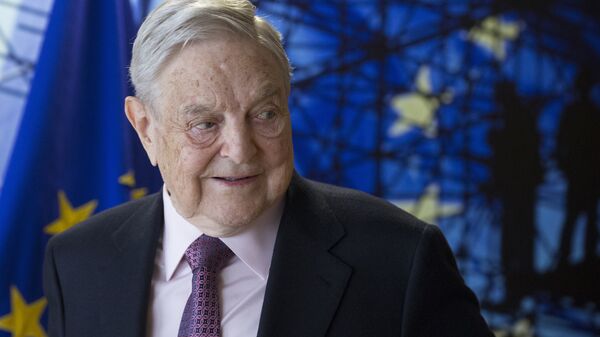The Open Society Foundation NGO of US billionaire George Soros, which has been repeatedly accused of meddling in the domestic affairs of several countries, is planning to support efforts opposing right-wing political forces in eastern Germany. The organisation’s director Selmin Caliskan stated that the NGO will assist groups that “share their values” and promised that details would be announced in the following months.
"The first step will be to launch a local initiative to combat hate crimes in eastern Berlin and the surrounding area with local partners," the organisation's director announced.
The Open Society Foundation reportedly supports about 50 civil non-government organisations in Germany. It moved to Berlin after it closed its office in Budapest as the Hungarian government stepped up activities countering uncontrolled migration.
A staunch opponent of illegal immigration and migrant quotas in the EU, Hungarian Prime Minister Viktor Orban has repeatedly stood up against the controversial US billionaire and globalism supporter and his NGOs’ programmes endorsing mass immigration, which he says are meant to weaken the mostly Christian European nations.
To tackle the issue, the country’s parliament last year passed a so-called “Stop Soros” bill, criminalising aid to illegal migrants and making it harder for refugees to seek asylum in Hungary.
Brexit Party co-founder Nigel Farage also took aim at Soros, dubbing him “the biggest danger to the entire western world”. In an interview, Farage said that Soros “wants to break down the fundamental values of our society and, in the case of Europe, he doesn’t want Europe to be based on Christianity” and alleged “the Goldman Sachs, the JP Morgans, and a particular Hungarian called Mr Soros” funded the EU.
The foundation’s announcement comes several months ahead of regional elections in several eastern German states, namely Thuringia, Saxony and Brandenburg. The former communist lands are considered a stronghold of the anti-establishment Alternative for Germany Party, campaigning, among other things, for stricter migration policy. The AfD made gains in the European elections in May after it managed to get seats in the German parliament and regional legislatures.
Although the party is criticised over its hardline stance by the country’s major political forces, Angela Merkel’s Christian Democratic Union and its coalition partner, the Social Democrats, calls for cooperation have also been heard. In the eastern state of Saxony-Anhalt vice chairmen of the CDU group in the local parliament, Ulrich Thomas, and lawmaker Lars Joern Zimmer, prepared a "memorandum" saying that CDU and AfD voters had similar goals, the Mitteldeutschen Zeitung newspaper reports.
"We should not rule out a coalition, at any rate. It is not possible now but we do not know what the situation will be in two or five years,” Thomas told the newspaper.
However, the CDU leadership rejected the proposal, noting it goes against the party’s decision to rule out an alliance between the CDU and the AfD.


